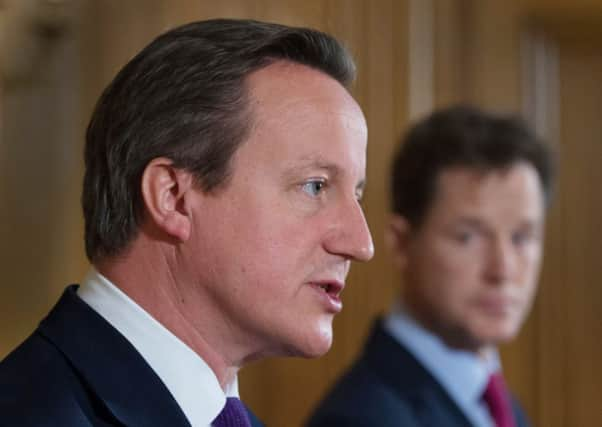Cameron calls for stronger surveillance powers


The Prime Minister insisted the measures being rushed through Parliament were needed to maintain existing powers following a European Court of Justice ruling.
But he made clear his support for new rights to intercept data to cope with changing technology.
Advertisement
Hide AdAdvertisement
Hide AdA proposal to introduce broader powers, dubbed the ‘snoopers’ charter’ was blocked by the Liberal Democrats last year.
Mr Cameron said: “My own very strong view is that we need to ask ourselves this simple question. Do we want as a country to leave a means of communication for paedophiles, terrorists and other serious criminals to communicate with each other that in extremis we cannot intercept?
“My own view is no we don’t.”
The emergency bill proposed yesterday by the Coalition and backed in principal by Labour follows a European Court of Justice ruling which, it was claimed, could lead to communications companies deleting crucial material used to tackle terrorists and serious criminals.
However, the Government faced criticism for giving MPs so little time to debate the measure - which is expected to be passed next week - when the original ruling was made in April.
Advertisement
Hide AdAdvertisement
Hide AdFormer Shadow Home Secretary David Davis described it as “theatrical emergency”.
The Haltemprice and Howden MP said: “They should have been prepared for it. Any competent department of state would have looked at the options, looked why it might go through, what might be struck down and so on and had legislation prepared then.
“We would have then had three months up until now to consider what we should do rather than this thing that’s going through in a single day. Extraordinarily unusual.”
The Government was also accused of trying to give legal cover to practices the European Court of Justice had clearly tried to outloaw.
Advertisement
Hide AdAdvertisement
Hide AdDr Subhajit Basu, an expert in cyberlaw at Leeds University said: “This is not just about protecting the public, this is more like Chinese style “blanket surveillance”.
“This is a hastily drafted and ill-conceived legislation that is merely reactive and not proactive.”
He added: “The safe guarding measures which the Government claims will ‘increase transparency and oversight’ are worth less than paper they are written on.
“We are increasingly under threat from the desire of public authorities to know more about us without giving proper justification the need to more about us.”
Advertisement
Hide AdAdvertisement
Hide AdBut despite his own previous opposition to extending surveillance powers, Deputy Prime Minister Nick Clegg insisted the emergency is needed.
“No government embarks on emergency legislation lightly but I have been persuaded of the need to act and act fast,” he said.